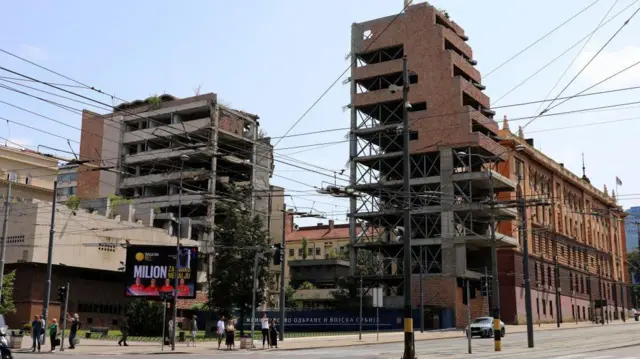Introduction: From War Damage to Luxury Real Estate
In a move that has sparked heated controversy in Serbia and abroad, Trump Tower Belgrade the bomb-scarred Ministry of Defence building in central Belgrade—targeted by NATO during the 1999 Kosovo conflict—is set to become the site of a luxury development. The project, spearheaded by Jared Kushner‘s Affinity Global and slated to feature a Trump International Hotel, is worth an estimated $500 million.
The announcement has reignited painful memories of NATO’s bombing campaign and raised questions about legality, historical preservation, and potential corruption. It also deepens global scrutiny of Trump-linked foreign business ventures.
The Site: A Symbol of Serbian History and NATO Trauma
The proposed development site consists of two partially destroyed buildings originally designed by architect Nikola Dobrovic. The structures symbolically mimicked Sutjeska Gorge and were constructed to welcome visitors to Tito’s Yugoslavia. The complex gained protected cultural heritage status in 2005.
Despite its crumbling facade, the buildings remain a potent reminder of Serbia’s resistance, loss, and NATO’s controversial intervention—particularly as the US was a leading member of the alliance.
The Deal: No Open Tender, No Upfront Cost
According to BBC reports, the Serbian government granted Affinity Global a 99-year lease on the site with no upfront payment. While they claim Serbia will receive 22% of future profits, experts like Andrew Peirson (formerly of CBRE) warn that bypassing an open bidding process undermines transparency and fairness in public land sales.
Legal Fallout: Forgery Allegations and Political Denials
On May 14, Serbian police arrested Goran Vasic, the official who signed off on lifting the site’s protected status. He confessed to fabricating an expert report—fueling claims that the Trump-Kushner project was given unlawful preferential treatment.
Despite this, President Aleksandar Vučić maintains that “there was not any kind of forgery,” defending the deal as a step towards stronger US-Serbia ties. Affinity Global, meanwhile, insists it had no connection to Vasic.
Public Reaction: A Nation Torn Between Progress and Memory
While some in the international business community, like James Thornley of KP Advisory, see the development as a way to revitalize a long-neglected part of the capital, critics argue that cultural memory and legality should not be compromised for economic gain.
Estela Radonjic Zivkov, former deputy director at Serbia’s Republic Institute for Protection of Monuments, warned: “No serious city builds a modern future by demolishing its historical centers.” According to her, the site’s legal protection cannot be revoked.
Conclusion: The Future of Trump Tower Belgrade Hangs in the Balance
As investigations unfold and legal uncertainty grows, the fate of Trump Tower Belgrade remains unclear. What is certain is that this high-profile venture, blending geopolitics, war memories, and business ambition, will continue to make headlines—and potentially shape Serbia’s image on the global stage.
The controversy has raised an important question: Can post-war memory coexist with capitalist redevelopment, or must one give way for the other?


